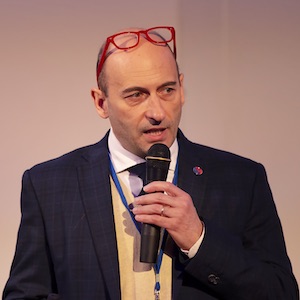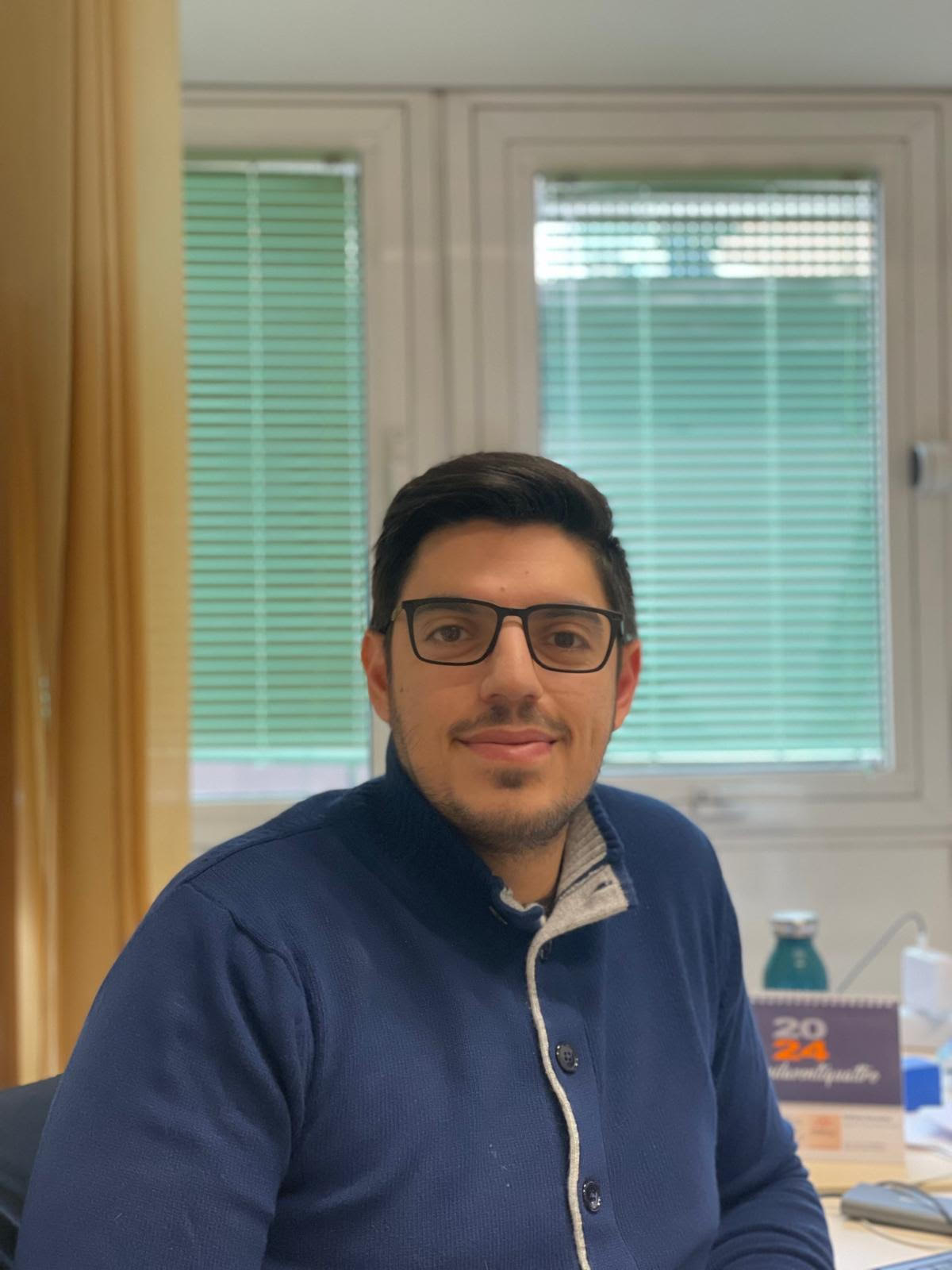Rafael Peñaloza
 Rafael Peñaloza is an Associate Professor at the University of Milano-Bicocca. His main interests lie within the area of symbolic AI, specifically in knowledge representation and reasoning, where he studies how to deal with imperfect knowledge; i.e., imprecisions, inconsistencies, uncertainty, preferences, and more, mainly connected with description logics and temporal logics. He has coordinated several national and international projects and is now part of the Department of Excellence DISCo in Milano-Bicocca, and of the FAIR project AMAR.
Rafael Peñaloza is an Associate Professor at the University of Milano-Bicocca. His main interests lie within the area of symbolic AI, specifically in knowledge representation and reasoning, where he studies how to deal with imperfect knowledge; i.e., imprecisions, inconsistencies, uncertainty, preferences, and more, mainly connected with description logics and temporal logics. He has coordinated several national and international projects and is now part of the Department of Excellence DISCo in Milano-Bicocca, and of the FAIR project AMAR.
Invited Talk - Rough Knowledge and its Refinement
We often learn concepts through refinement. From a rough general approximation, more details are observed and captured, and general concepts are partitioned into more specific classes. Based on this insight, we study rough description logics with a hierarchy of equivalence refinements. We show how to reason with this logic and how to navigate between levels of detail.
Stefano Bistarelli
 Stefano Bistarelli is a Full Professor of Computer Science at the University of Perugia, Italy. He obtained his PhD in Computer Science from the University of Pisa in 2001, earning national recognition for the best doctoral thesis in both Theoretical Computer Science and Artificial Intelligence. His research interests span knowledge representation and reasoning, constraint programming, argumentation, cybersecurity, and blockchain technologies. He has authored a seminal book on soft constraints published by Springer and currently serves on the editorial boards of Argument & Computation and Intelligenza Artificiale. Prof. Bistarelli directs the CINI National Cybersecurity Laboratory node in Perugia and coordinates the Knowledge Representation and Automated Reasoning (KRAR) Lab, which is also the Perugia node of the CINI National Laboratory on Artificial Intelligence and Intelligent Systems (AIIS). He also leads national working groups on Distributed Ledger Technologies and Argumentation in AI.
Stefano Bistarelli is a Full Professor of Computer Science at the University of Perugia, Italy. He obtained his PhD in Computer Science from the University of Pisa in 2001, earning national recognition for the best doctoral thesis in both Theoretical Computer Science and Artificial Intelligence. His research interests span knowledge representation and reasoning, constraint programming, argumentation, cybersecurity, and blockchain technologies. He has authored a seminal book on soft constraints published by Springer and currently serves on the editorial boards of Argument & Computation and Intelligenza Artificiale. Prof. Bistarelli directs the CINI National Cybersecurity Laboratory node in Perugia and coordinates the Knowledge Representation and Automated Reasoning (KRAR) Lab, which is also the Perugia node of the CINI National Laboratory on Artificial Intelligence and Intelligent Systems (AIIS). He also leads national working groups on Distributed Ledger Technologies and Argumentation in AI.
Invited Talk - Arguing Together: The Evolution of a Concurrent and Timed Argumentation Language
Formal argumentation has become a central framework for modelling reasoning and interaction in AI, from deliberation and negotiation to decision support and explainability. While Dung-style argumentation frameworks—crisp or weighted—offer robust semantics for abstract argument relations, they lack the expressive power needed to model concurrent, dynamic, and temporally aware interactions among agents. In this talk, I will present the evolution of a concurrent and timed language for argumentation, designed to bridge this gap. Starting from the foundations of argumentation theory, I will motivate the need for a language-based approach to represent and simulate agents that argue, negotiate, and interact within a shared argumentative space. The proposed language provides constructs for concurrency and timing, allowing for two forms of parallelism: maximum parallelism, which models simultaneous independent steps, and interleaving, which captures more fine-grained agent-level transitions. I will illustrate how the language supports high-level patterns of argumentation and dialogue, and how it can be used to model debates, dialogues, and reasoning processes in a structured and semantically grounded way. The talk will conclude with insights on ongoing developments, including privacy concerns, local arguments, and the integration of high-level abstractions.
Giuseppe Mazzotta
 Giuseppe Mazzotta is a Post-Doctoral Researcher in Computer Science at the Department of Mathematics, University of Calabria, Italy. He obtained his MSc Degree in Computer Science in 2020 and completed his PhD in Computer Science and Mathematics in 2023 at the same institution. Giuseppe’s research focuses on knowledge representation and reasoning, particularly in Answer Set Programming (ASP). During his PhD, he specialized in developing efficient techniques for evaluating ASP programs affected by the grounding bottleneck problem. His work has been published in international conferences, earning him recognition such as the “AAAI Outstanding Student Paper Honorable Mention” at the 36th AAAI Conference on Artificial Intelligence.
Giuseppe Mazzotta is a Post-Doctoral Researcher in Computer Science at the Department of Mathematics, University of Calabria, Italy. He obtained his MSc Degree in Computer Science in 2020 and completed his PhD in Computer Science and Mathematics in 2023 at the same institution. Giuseppe’s research focuses on knowledge representation and reasoning, particularly in Answer Set Programming (ASP). During his PhD, he specialized in developing efficient techniques for evaluating ASP programs affected by the grounding bottleneck problem. His work has been published in international conferences, earning him recognition such as the “AAAI Outstanding Student Paper Honorable Mention” at the 36th AAAI Conference on Artificial Intelligence.
Invited Tutorial - ASP with Quantifiers: A Natural and Efficient Way to Tackle Problems Beyond NP
The success of Answer Set Programming (ASP) stems from its highly expressive language, capable of modeling complex combinatorial problems, and from the availability of efficient solvers that make ASP practical in real-world scenarios. However, despite these strengths, the expressiveness of ASP is inherently limited to the second level of the Polynomial Hierarchy (PH). As a result, a wide range of problems that go beyond this complexity class cannot be modeled in ASP. To address this limitation, Answer Set Programming with Quantifiers (ASP(Q)) has been proposed. ASP(Q) extends the ASP language with the ability to quantify over answer sets, enabling a natural modeling of problems across the entire PH. In this tutorial, we explore the ASP(Q) formalism along the two dimensions that have driven the success of ASP: modeling capabilities and efficient solving. First, we will demonstrate how ASP(Q) allows for natural and intuitive modeling of several hard (optimization) problems of practical relevance. Then, we will turn our attention to the efficient evaluation of ASP(Q) programs. Specifically, we will introduce the PyQASP system, which compiles ASP(Q) programs into compact and optimized Quantified Boolean Formulae (QBF), allowing them to be evaluated effectively using well-established and mature QBF technologies. Through this tutorial, attendees will gain a comprehensive overview of the ASP(Q) formalism and how it can be applied to model and solve problems beyond NP across a variety of practical domains.